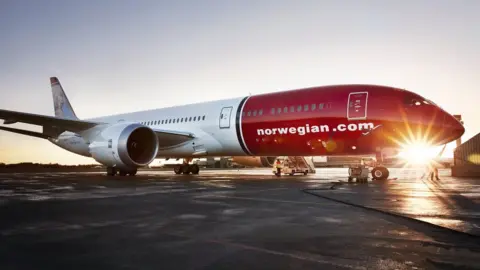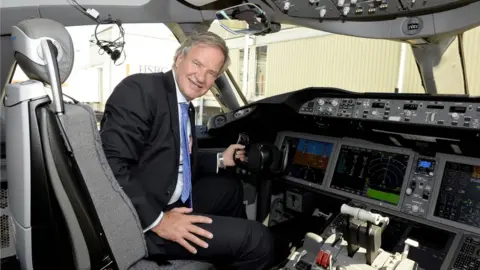Norwegian Air seeks cash injection
 Norwegian
NorwegianNorwegian Air wants to raise 3bn Norwegian kroner (£268m) through a rights issue to improve its finances.
The news comes as the company announced that its preliminary earnings for 2018 showed an operating loss of roughly 3.8bn kroner.
The budget carrier said it was not in talks with any potential buyers after British Airways owner IAG abandoned its plans to buy it last week.
In early trading on Tuesday, the company's shares plunged by 16%.
Billionaire John Fredriksen and the airline's chief executive Bjorn Kjos and chairman Bjorn Kise have all agreed to underwrite the issue.
Mr Kjos explained that the airline was going to change its strategic focus from growth to making cost savings.
"We will now get in place a strengthened balance sheet that supports the further development of the company," he said.
In a statement, the airline added that this would "increase its competitiveness and stand-alone financial strength".
The carrier confirmed that flights were unaffected by the news.
A rights issue happens when existing shareholders of a company are offered the chance to buy new shares at a special price.

Analysis
Theo Leggett, business correspondent
Norwegian is in a race against time. The company is nothing if not ambitious - and it has certainly made an impact in Europe's cut-throat aviation market. But it needs to become consistently profitable, before the money runs out.
Norwegian's chief executive, Bjorn Kjos, has overseen a major expansion of the airline over the past five years, doubling the size of its fleet and expanding its route network dramatically. But his biggest gambit has been a major play into the low-cost long-haul market.
Cheap transatlantic travel is not a new idea: Freddie Laker tried it in the 1970s.
But it was only with the development of highly fuel-efficient aircraft like the Boeing 787 Dreamliner - which Norwegian is using - and the Airbus A350 that the idea really took off.
Now others are following Norwegian's example.
But all of this has come at a price. Norwegian has debts of $3.5bn and expects to rack up a sizeable loss for 2018.
Problems with engines on its shiny new Dreamliners clearly haven't helped either.
Small wonder Mr Kjos now says the carrier will focus on cost-cutting and profitability, rather than growth. His airline has shaken up the market - now it needs to show it can consistently make money from it as well.

Last year, Norwegian Air launched the first-ever budget flight from London to South America
Fares on the 14-hour trip to Buenos Aires started from £259 one-way.
The company started as a small regional airline flying between Bergen and Trondheim in 1993.
 Norwegian
NorwegianMr Kjos turned it into Scandinavia's largest airline and the third-biggest budget carrier in Europe.
Norwegian's price strategy has been based on flying a young fleet of aircraft such as Boeing's 787 Dreamliner, which burn less fuel per passenger compared with other long-haul aircraft.
These offer passengers a more upmarket experience than they may have come to expect from a budget airline, with modern interiors and the benefit of free wi-fi on all routes in the future.
It flies from Gatwick, Manchester and Edinburgh airports to more than 150 destinations across Europe and worldwide including Boston, Dubai and San Francisco.
But in the second quarter of last year, the Civil Aviation Authority's most recent data, Norwegian was the airline with the second highest number of complaints from UK passengers, of those still in business.
It received 526 complaints per million travellers carried in that three-month period to June 2018, behind Tui Airways with 663, but ahead of TAP Portugal, with 430, and Ryanair, with 319.
Small Planet Airlines, which had its licence suspended by the CAA in November after filing for insolvency the previous month, had received 27,998 complaints per million customers in the same period.
Budget airlines have had differing fortunes in recent months.
In November, EasyJet announced a 41% rise in pre-tax profits to £578m for the year to 30 September.
And earlier this month, it said that it expected its full-year profits to meet City forecasts.
However, Ryanair cut its profit forecast, blaming lower-than-expected air fares.
